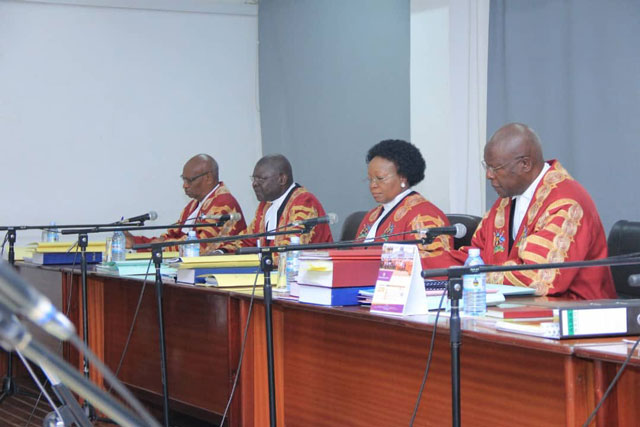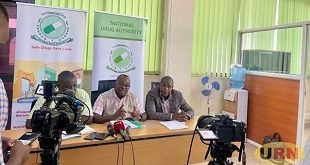
The 7 Supreme Court justices will determine these eight key issues
1⃣ Issue No. 1
Whether the Constitutional Court erred on the application of the basic structure doctrine.
2⃣ Issue No. 2
Whether the majority justices of the Constitutional Court erred in holding that the entire process of conceptualising, debating and enactment of Constitution (Amendment) Act 2018 that removed the presidential age limit from the Constitution did not contravene the 1995 Constitution and Rules of Procedure of Parliament.
3⃣ Issue No. 3
Whether majority justices of the Constitutional Court erred when they held that the violence/scuffle inside and outside Parliament during the enactment of the Constitution (Amendment) Act 2018 did not contravene the Constitution.
4⃣ Issue No. 4
Whether the Justices of the Constitutional Court erred in law when they applied the substantiality test in determining the petition.
5⃣ Issue No. 5
Whether the learned Justices of the Constitutional Court erred when they held that the removal of the age limit for the President was not inconsistent with the Constitution.
6⃣ Issue No. 6
Whether the Constitutional Court was wrong in holding that the president elected in 2016 is not liable to vacate office upon attaining the age of 75.
7⃣ Issue No. 7
(a): Whether the justices of the Constitutional Court derogated the appellants’ right to a fair hearing, un-judiciously exercised their discretion and committed the alleged procedural irregularities.
(b): If so, what is the effect on the decision of the court?
8⃣ Issue No. 8
What remedies are available to the parties?
Kampala, Uganda | THE INDEPENDENT | Judgment on the consolidated appeals challenging the outcome of the age limit petition is set for today. The confirmation was given this afternoon in a notice issued by Supreme Court Deputy Registrar Godfrey Opifeni.
The appeal stemmed from a Constitutional Court judgment delivered by a panel of five judges at Mbale High court about eight months ago upholding the amendment of the constitution in which parliament lifted the cap on the presidential age.
The judges, Cheborion Barishaki, Elizabeth Musoke, Alphonse Owiny-Dollo and Remmy Kasule, said the act was passed in line with Constitutional procedures. But Justice Kenneth Kakuru dissented in his judgment noting that the entire process of amending the Constitution was flawed since the majority of the legislators never consulted citizens, in whom the power is vested.
But the decision was challenged by city lawyer Male Mabirizi, six opposition members of Parliament and Uganda Law Society. Mabirizi raised 16 grounds on which the Judges erred in law delivering their judgment.
He said that the judges erred in law when they failed to state the reasons for their decision not to summon the speaker of Parliament to testify in the initial petition on matters that relate to the conduct of parliament and events that dominated the process. Mabirizi also contends that the justices erred in fact when they contradicted themselves on legal principles and facts of the case, prompting them to reach wrongful conclusions.
He added that the justices erred when they held that a president is not liable to vacate office on attaining the age of 75 years until his term expires. Mabirizi and the other petitioners demanded that the Constitutional Court process be declared null and void for derogating the right to a fair hearing. He also wanted the constitutional petition returned to the Constitutional Court for expeditious hearing before a different panel in compliance with fair hearing principles.
The petition was heard by a panel of Seven Judges led by Chief Justice Bart Katureebe. The others are Stella Arach Amoko, David Mwangutsya, Apio Aweri, Lillian Tibatemwa, Paul Mugamba and Jotham Tumwesigye.
During the hearing, the Attorney General William Byaruhanga together with dozens of senior government lawyers argued that the law should be maintained in the constitution because it was passed lawfully.
The Attorney General submitted that whereas citizens of Uganda were consulted on some provisions of the constitutional Amendment law, the citizens were never consulted on the issue of Article pertaining to the presidential age because it was unnecessary. He argued that the views of the Ugandan population were presented by their respective members of Parliament
His Deputy Mwesigwa Rukutana also put up a spirited fight for maintaining the law arguing that it doesn’t impose any charges on the consolidated fund. Solicitor General Francis Atoke argued that the law should be maintained because provisions that were found to be unlawful were expunged by the constitutional court.
Earlier, Male Mabirizi has sued the Chief Justice of Uganda demanding an order to compel him to deliver the same judgment. He argued that the delay in delivering the judgment beyond the mandatory 60 days is contrary to the Judicial Code of Ethics.
****
URN
 The Independent Uganda: You get the Truth we Pay the Price
The Independent Uganda: You get the Truth we Pay the Price


